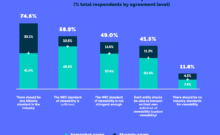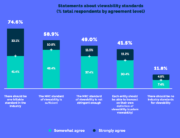World Federation of Advertisers’ members including Procter & Gamble, Unilever, Mastercard and Diageo issue a bugle call for all players of the complex adtech ecosystem – ad-tech companies, agencies, publishers and platforms – to work with advertisers in an effort to create a fraud-free, transparent, and consumer-friendly digital advertising environment.
Led by more than ten of the world’s top advertisers and advertiser associations in the top ten global ad markets – including Australia, Brazil, Canada, China, France, Germany, UK, US – the ‘Global Media Charter’ sets out eight ‘Principles for Partnership’ aimed at rebuilding trust for digital advertising.
The 8 principles as documented in the charter are:
- Zero tolerance to ad fraud with compensation for any breach: a streamlined process to refund all media investments, including fees/commissions, found to be associated with invalid traffic/non-human impressions. Advertisers seek to use accredited third-party verification solutions to assess exposure to ad fraud.
- Strict brand safety protection: Advertisers require platforms and publishers to accept responsibility for the content carried on their sites and to employ comprehensive and rigorous safeguards on which accounts and channels can host paid advertising. Advertisers commit not to target media investment at content platforms that misuse and infringe IP laws or sites responsible for fake news content or disinformation.
- Minimum viewability thresholds: Brands should be able to trade against the viewability level that is appropriate for their business including 100% in-view for full duration if desired. Advertisers understand that higher viewability standards could impact on inventory supply and campaign reach.
- Transparency throughout the supply-chain: complete transparency through the supply chain (digital or otherwise) covering pricing and trading, fees and costs, placement and data usage. Advertisers respect the right of partners to be profitable and commit to relevant and fair levels of remuneration for services rendered.
- Third-party verification and measurement as a minimum requirement: Self-reported data is unacceptable, and advertisers need third-party verification that inventory is viewable, fraud-free, brand safe and on-target. Advertisers commit to prioritise third-party ad serving and verification companies who are audited and certified by the relevant industry-approved bodies.
- Removal of ‘walled garden’ issues: data and technology should be unbundled, allowing advertisers to use the third-party buying platform of their choice in any and all environments. Publishers and platforms should work to create a solution that provides impression level data with spend tracking companies to enable brands to track media spend in their category and competitive set.
- Improving standards with data transparency: Data supply chain partners must uphold the same high standards outlined in the WFA’s Data Transparency Manifesto. Advertisers commit to working with partners to ensure data is ethically and transparently sourced as well as securely stored with appropriate assurance mechanisms, including audits. Data collection should be the minimum required to deliver a quality advertising experience.
- Take steps to improve the consumer experience: Consumers are becoming increasingly frustrated with ads that disrupt their experience, interrupt content, slow browsing or eat up their data allowances. Advertisers and platforms should design commercial communication opportunities so that they are less intrusive and offer a better user experience.Implementation of the charter calls on all players in the media value chain to do their part and collaborate to clean up digital advertising as we know it, keeping the interests of all the key players- advertisers, publishers, agencies and of course the audience, in mind.
Read More At The Original Article: www.martechadvisor.com









